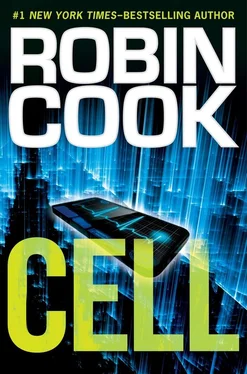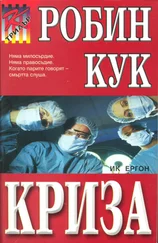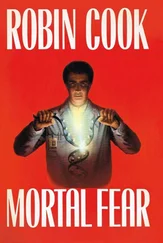“We are counting on your being honest,” Thorn said, as if reading George’s mind. “Just as we are prepared to be straightforward with you. What we have in mind,” he added, motioning first to George and Paula and then to Langley and Clayton, “is for all of us to be on the same side.”
George looked from one man to the other, trying to gauge their sincerity. All three stared back, unblinking. Clayton in particular had hardly spoken since he walked in the door. George had no idea what he was thinking.
George cleared his throat. He glanced at Paula.
She nodded to him and gave his thigh another squeeze.
“I thought the drug reservoir in all of these people had played a role. I made the effort to find the reservoir that had been embedded in DeAngelis’s abdomen.”
“How did you manage that?” Thorn asked.
“It wasn’t easy. First I tried to obtain it at the morgue, where I saw Clayton apparently doing the same.”
Thorn and Clayton exchanged a glance.
Clayton spoke for the first time. “I did go to the morgue for that reason but didn’t find the reservoir.”
Thorn nodded and looked back at George. “Go on.”
“Well, I didn’t know it wasn’t where it was supposed to be. I then tried to retrieve it from the corpse at a funeral home. That’s when I realized that it had already been removed. And since I had seen several people searching DeAngelis’s apartment, I assumed everyone was looking without success. So, I figured maybe DeAngelis had succeeded in cutting it out of himself while driving to the medical center. I located the crash vehicle at a salvage yard and was able to find the reservoir inside the car.”
“You found it?” Thorn asked nervously. He exchanged a quick glance with his colleagues.
“I did. With a lot of effort.”
“Did you examine it?” Thorn asked.
“Of course. I used a dissecting microscope. The reservoir was completely empty, which I thought very disturbing, since it was supposed to have lasted for several years. Not two months.”
“What did you deduce from the empty reservoir?”
George looked directly at Thorn, thinking the executive was being deliberately obtuse. “I was worried that it had been a deliberate event and that—”
Thorn interrupted. “What do you mean by ‘a deliberate event’? Let’s call a spade a spade. You thought his death was a homicide?”
“Yes,” George said, nodding. The cat was now out of the bag. “And I set out to prove it.”
“And how did you do that?”
“I had gotten hold of DeAngelis’s broken smartphone and had an IT-savvy friend of mine see if he could determine if the phone had received a message to do a global dump, meaning emptying the reservoir all at once. My friend confirmed that to be the case. The phone had jammed from the force of the crash, meaning its memory hadn’t been remotely wiped clean by iDoc. An unaltered record of iDoc issuing a mass dump is in my possession.”
Thorn looked to Langley with a frown. Langley squirmed.
“I knew then that Sal’s death had been deliberate, not a malfunction of either the reservoir or the smartphone. I then encouraged my friend, Zee Beauregard, to try to hack into the iDoc servers to see if he could find the command to do the dump. I was worried about that type of thing after reading an article describing the potential problem of hackers breaking into wireless health care devices.”
“You had your friend do this even though you and he knew that hacking into iDoc servers was a serious crime?”
“Of course!” George snapped irritably. “But the circumstances warranted the risk!”
Thorn held up his hand. “Please. I commend both your reasoning and your persistence.”
Langley was impatient now; the discussion was getting into his bailiwick. “What did this Zee fellow find?”
“At first everything seemed normal. There was no evidence of a global-dump command, meaning that Sal’s smartphone had been hacked. But then Zee noticed something that he called an artifact. The presence of this artifact indicated to him that there had been an overwrite of the record. He reasoned that there probably had been a dump command, but it had been overwritten. He found the same artifact in all five of the cases I was looking into. It wasn’t an easy thing to spot on its own, but the fact that it appeared exactly seventeen minutes before the death of each of the five patients helped him identify it.”
George noticed Thorn glaring at Langley, who glanced away. George sensed that Langley had been responsible for the overwrite and had essentially screwed up, which was why Zee discovered it.
With an exasperated expression, Thorn turned back to George. “Okay, you suspected a homicide. What were your thoughts up to this point?”
George hesitated.
“Please,” Thorn persisted.
“I thought that someone or some group at Amalgamated had decided to use iDoc to save money.”
“Can you be more specific?”
“I was worried that someone had been using iDoc as a kind of ‘death panel’ and then overwriting the commands to get rid of the evidence.”
Thorn and Langley nodded.
“Again,” Thorn said, “I must commend you on your reasoning and work, but... at the same time, I have to tell you that you are wrong.”
George looked at Thorn, puzzled.
“I’ll let Lewis explain what really happened.”
George and Paula leaned forward, their anger and fear momentarily forgotten.
MENTAL HEALTH FACILITY
HOLLYWOOD HILLS, LOS ANGELES, CALIFORNIA
MONDAY, JULY 7, 2014, 9:28 A.M.
It was Langley’s turn to clear his throat. “First and foremost,” he began, lowering his voice as if concerned about being overheard, even though the attendants had left the room, “I have to go back to basics. I must be certain that both of you really know what it means for a program to be heuristic.”
George and Paula exchanged a glance. To both of them it seemed a strange way for Langley to start.
“Of course I do, Lewis,” Paula replied. “I’ve been selling that feature to God knows how many people!”
“I’m mostly interested in Dr. Wilson’s answer. But still, selling heuristic and understanding heuristic can be two different things.” He turned to George.
“I have an idea, but I’m not entirely sure I could define it.”
“In its original meaning, ‘heuristic’ denoted a speculative concept that could serve as a guide in the solution of a problem, or a teaching method by which learning takes place through discoveries made by the student himself.”
George and Paula looked at each other for a moment with confusion. Neither understood what Langley was saying. George, in particular, under the circumstances, found Langley’s comments bizarre.
“In computer programming,” Langley continued, “‘heuristic’ means a problem-solving technique that can be described as the ability to take advantage of previous solutions. What I mean is that the application incorporates information and solutions in its database to apply them in future problems, which it had not been originally programmed to solve.” Langley focused on George to see if he was grasping it.
George nodded. It seemed like an awfully complicated way to say that a computer program could learn.
“It was important from the outset that the iDoc algorithm be written to enable it to take advantage of previous cases that it had encountered and to do it quickly. The initial alpha trials gave us an idea of the number of situations that would need a flesh-and-blood medical specialist as backup. To fulfill this need we created what we call the ‘control room.’ The control room is—”
“Paula actually has taken me on a visit to the control room,” George interrupted, hoping Langley would get to the point more quickly.
Читать дальше












